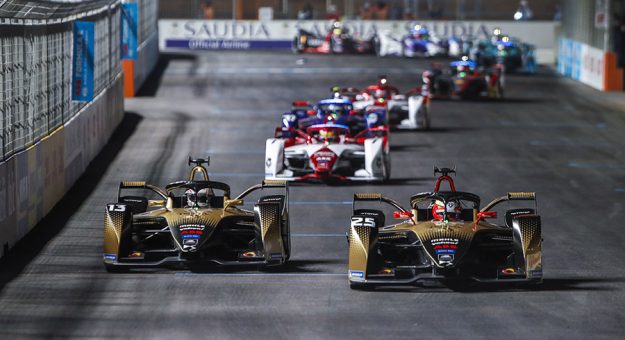INDIANAPOLIS — Without sound, will there still be fury?
Electric cars are coming; it appears inevitable that the automotive world is going to transition from internal combustion power to electric. Several major automotive manufacturers — Ford, GM and others — have announced their plans to offer only electric cars and trucks within 15 years.
Would I have an electric vehicle as my daily driver? Sure, if it made financial sense and I enjoyed the driving experience. But would I be interested in watching electric cars race? That’s an entirely different matter.
The sound of fuel detonating in a cylinder has been a key part of the racing experience since the beginning. Everybody — and I mean everybody — in motorsports can relate to the visceral experience of being surrounded by roaring, screaming race cars.
Electric motors will generate none of that sound.
I’m a big believer in “never say never.” But I’ve got to be honest: Racing without the roar is probably going to feel hollow and empty.
Imagine watching two Top Fuel (won’t they have to change the name?) dragsters launch without shaking the earth.
Imagine watching the Little 500 and carrying on a conversation with the guy alongside without having to raise your voice.
Imagine sitting in the first turn for the opening lap of the Indianapolis 500 and hearing only tires squealing as the cars pass by.
Imagine the field of the Knoxville Nationals coming to the green and hearing only the “whoosh” of air passing over the cars.
Imagine an in-car TV ride in a NASCAR Cup Series car with no engine sound, only … motion and silence.
Any of us who were exposed to racing as children from the 1950s through the 1990s experienced significant evolution along the way. Electronic ignition, tires, aerodynamics, safety equipment, shocks and suspension improvements … certainly all changed the sport, but the physical and emotional experience was largely the same as before.
The electric revolution will be different. Nothing the sport has ever experienced — and we’re looking back at more than a century of history — will impact motorsports like the profoundly different experience of internal combustion engines as compared to electric motors.
Many will argue that the transition to electric power is inevitable and they are probably right. But it’s not difficult for motorsports people to view the future with a sense of apprehension.
This isn’t just a concern for more senior fans; younger people, too, have a strong affection for the sound of fuel being burned. The first thing today’s teens do with their import tuner car is … change the muffler to something loud. It’s obvious that sound is still a key part of the motoring experience — even for a kid born in 2005.
Right now, electric vehicles are racing primarily against each other. It isn’t going to be long, however, before every form of American motorsports will be confronted with somebody who wants to compete against traditional cars with an electric entry. Electric race cars are coming, probably sooner rather than later.
When that change comes, will all the traditional racers, builders and fans come along? Will they be willing to work and compete and follow along with silent race cars?
Earlier this year, legendary drag racer Chris Karamesines was interviewed about his decision to step away from competitive drag racing at the age of 89 (or 92, depending on the source). “The Greek” has continued to drive NHRA Top Fuel dragsters at 300-plus mph some 30 years beyond most other mortals, a truly amazing and unmatched feat.
Karamesines was asked his opinion of electric dragsters. He didn’t miss a beat with his reply.
“That’s for the young people,” he said. “If they like cars like that, go for it.”
Yes, that’s it. If you like cars like that, go for it. As for me, I think I’ll just sit here and revel in that roar until it isn’t there anymore.
